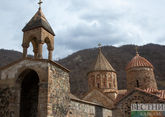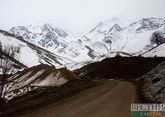For a long time, Armenians, changing the names of the occupied territories, are trying to erase the history contained in the true names of those regions from the memory of the people. They try to present even the words of truly Turkic-Azerbaijani origin as Armenian to the world. One of these words is a toponym ‘Arsak’, which has no relation to hays (Armenians) and it has been repeatedly proven, Kamran Rustamov writes in the article ‘The etymology of the word ‘Artsakh’.
Pompey Trog put forward the idea that "The origin of Arsag is not known." Danish scientist M. Thomsen, who translated the language of the Orkhon inscriptions to the world, repeats the same idea about Ases. V.V. Bartold calls Ases ‘not Turks’, and L.N. Gumilev calls them ‘mysterious people.’ The presence of the particles as / az in the names of the continents, countries and seas - Asia, the Caucasus, Azov - proves that Ases were considered once as one of the great nations of the world. The presence of the root ‘as’ in the ancient and modern names of rivers, seas and mountains - Astrakhan, Astara, Asna (village, river, tribe, mountain - Sharur region), such toponyms as Os / Osh (Kirghizia, France, Hungary, etc.) - is a proof that Ases lived in many countries. In different places, such as Hungary and Chuvashia, you can see the density of toponyms associated with Ases - Eses, Ossas, Ases, Ashers / Asers, which is a memory of the great past of Ases preserved to our times. In distant Japan, there are names of cities, rivers, Asahi seas (white Ases), which attract attention as phonetic variants of the words asak / akas. 19th-century author Ivan Chopin also points to the presence of rivers, mountains and seas in the Caucasus, in the names of which there is As, and calls Asahs (white Ases) true lords of these places. The author explains the meaning of the word as a ‘rider’.
Thus, the disclosure of the mystery of the origin of the word ‘sak’ in the word Arsak from the word ‘asak’ allows shedding light on many toponyms, ethnic toponyms and anthroponyms. The corresponding style of recording the facts of the Orkhon Inscriptions (5-9 centuries) about the modification of ‘Asaka’ into ‘Sak’ and ‘Sak’ into ‘Asak’ must be perceived as one of the mysteries of history ... The language of Orkhon Inscriptions contains ethnonyms beginning with the letter ‘A’, but existing as an intra-text transcription.
The last of these samples, ks, was transcribed by ancient, non-Türkic authors not in its true form of ‘kas’ (caspia), but without the ‘a’ sound, which led scientists away from the interpretation of the stories about ‘Akas’, to the ‘abstract tribes’ of Kases, the fate and meaning of which are not known. Therefore, Herodotus wrote about them as follows: "Kases are long extinct, disappeared people.’

As an example we can lead the Turkic eponyms and ethnonyms mentioned in ancient and medieval sources, the meaning of which is still unknown: kun (hun), bun, sibun, bask, ser, serik (Seriks), Kerr (iya), etc. All these words reveal their true meaning if add the letter ‘a’ - akun (akhun - white boys - white Huns, Ebuns - 10 Ebs, Asibun - houses of On Ases), the oldest Turkic-speaking inhabitants of the Caucasus: Ebas ak (saki) - eb-ev (home) - the birthplace of white aces (the Caucasus), aser-azer, aserik (Aseriks) - Second men Ases, Aker-Iya- (the Caucasus) - White Lionhearts. All these examples prove that ‘sak’ existed in history as ‘asak’. In the work ‘Strabo’, written in the 5th century BC, the name of the Iranian Shah Xerxes and the name of the region on the Ermen-Turkic land of Xersen are found. The pronunciation of ‘Akas’ as ‘ks’ is also found in these words. It changed greatly the name of these Turkic samples. According to the ancient Turkic alphabet ak, aser akas ... (Lord of the White Ases) and Akas er ak as on ... (Lord of the White On Ases) meant titles and posts relating to the millenniums BC. The ancient Turkic lands ‘Ulu gak as er eli’ and ‘Kichig ak as er el’ (‘el’ means country) are probably the ancient names of the ‘Big Media’ and ‘Small Media’. These names have survived to the present day in the Algerian and Moroccan toponyms ‘Alcacer Quibir’ and Alcacer Sagir.’
Rum (Turkey) ‘Eron’. According to the peculiarities of the ancient Turkic alphabet, this word is pronounced in the text as (Ron) run. The word consists of two parts - ‘er’ and ‘on’. There are many examples of using the number On (ten) as the word ‘un’: Unageb - the Homeland of on Aha - great lord - white lionheart, Marv-ov, Karkun-ov. Hence ‘Eron’ means Homeland of on lionhearts. In the millennia BC, Turkic-As tribes were numbered from 1 to 1000 and further. In this sense, in the transcription of non-Turkic authors, Eron is mentioned (without e) as ‘Run’. In the Caucasus, there is information about Aragon and Alazon (er, ak, on, and on) Az on - on Azes and On tribes. The replacement of ’n’ to ‘m’ as in the word ‘Run’ was characteristic of the Turkic language of the early period. M. Kashgari (9th century) writes about substitutions in the pronunciation gurun-gurum, Bogun-bogum: "This law is a feature of Turkic languages, I consider it as ‘New Turkic’. But some ordinary people of Kipchaks and other tribes speak the same way.”
RAG. According to ‘Strabo’, after the restoration, the city called by Greeks ‘Europ’, the Parthians called ‘Arsak’. According to the above-mentioned peculiarities of the Turkic language, this word is Erak (Arak) ‘white lionhearts’, and the written form of this word by the Greek authors was transcribed not as Eraq (Arak), but in the wrong form of Rag (k replacer by g). The form of the pronunciation of this word in the language of the ancient Turkic tribes (one hundred and thousand years BC) is reflected in the names of the tributary of the Kura - ‘Arak’, and also in the name of the city of Media ‘Rag’ (the true name is Eraq - the place of white lionhearts).
Associated with the names of ‘Eraks’ (Arak) the names of the tribes, regions and personalities of Akar (nannia), Akar (nana) is an evidence of the existence of the permanent homeland of Ersaks not only in the Caucasus but also beyond.
Yagut Hamavi (12-13 centuries) reports that Media’s city Rag, known by Ibn Khordadbeh as ‘Er-Rei’ (near Tehran) was conquered by Khalif Omar, and then in 1220, destroyed by Mongols. It becomes clear that the name of the state ‘Iraq’, which Iraqi Turkmens still pronounce as ‘Erag’, is associated with ‘akers’ and Arabs pronounced it as ‘Erag’. It should be noted that the name of present-day Iran came from the word ‘Iron’ (means brave ons in gypchag) appeared this way and is a word of Turkic origin. Today it is known as Iran. It should also be added that the toponym ‘Ironi’ in the Caucasus (Georgia) also confirms this fact.
Van (Turkey) ‘Ebon’. The meaning of this word associated with the name of the tribe On ev (ten houses) means house - the birthplace of Onases. The ancient names of the cities, lands, settlements and mountains of Ion, Eleon (Il on, Al on) and such toponyms as Aragon (er ak on - ten white lionhearts) is a historical proof that on as ers (Sak lionhearts) are the indigenous people of Middle East, Asia and other places. The substitutions of b to f, e to a, a to o in the names of the mountains, and also of the Afon (Afos) peninsula in Thrace - the house of Ons (the house of on Ases) are of the same origin with ‘Bon’. The transcription of ‘ebon’ without sound ‘e’ led to the emergence of the name of the country and lake with the same name ‘Van’. The historical and modern names Arbun, Orkun (Orkhon River), Krun, Karun, Askeran, Shabran (Sabran) and other names of the regions are associated with aks (saks), and also reflect the concept of Ersak.

From all the abovementioned it becomes clear that the word Ersak by origin and meaning is one-root with the ‘er’ prefiх, which can be found in the beginning of the words Ersara, Ertogrul, Erdahan, Erdebil, Eraz (Araz), Erzurum, Eraq (Erah), and it is an originally Turkic word ...
... Of course, the foreigners who have invaded the Caucasus do not have a historical or moral right to own the lands of Karabakh, the name of which came from the word ‘Er Asak’ - Ersak (Arsak), meaning ‘House of White as Ers’ (Oguzes), and all the territories associated with this name.










